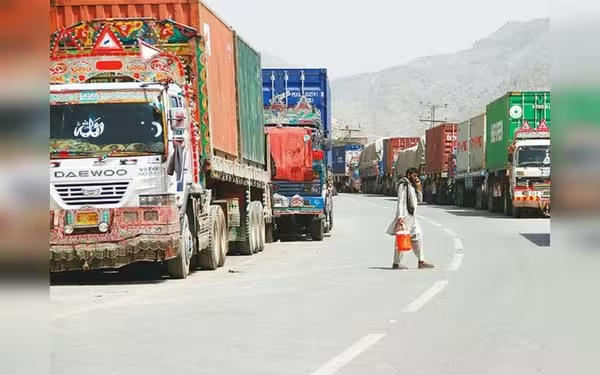Saturday, November 16, 2024 07:26 PM
KP Exports Plummet After 2% Infrastructure Development Cess
- Exports from KP have declined by up to 70%.
- Local businesses are shifting operations to other provinces.
- Taxation on exports threatens livelihoods and economic stability.
 Image Credits: brecorder
Image Credits: brecorderThe imposition of a 2% cess in KP has led to a 70% drop in exports, threatening local businesses and livelihoods.
PESHAWAR: The recent imposition of a two percent Infrastructure Development Cess (IDC) by the provincial government of Khyber Pakhtunkhwa (KP) has sparked significant concern among local business leaders. This new tax, applied to the commercial value of export consignments, has reportedly led to a staggering reduction in exports from the province, with estimates suggesting a decline of up to 70 percent. Such a drastic drop not only threatens the viability of many businesses but also jeopardizes the livelihoods of thousands of individuals who depend on these exports for their income.
Prominent figures in the KP business community, including well-known exporter Khalid Sultan and Zia-ul-Haq Sarhadi, Coordinator of the Pak-Afghan Joint Chamber of Commerce and Industry (PAJCCI), have voiced their apprehensions regarding the long-term implications of this tax. They argue that if the government does not reconsider this decision, the export volume from KP could diminish even further, exacerbating the economic challenges faced by the region.
In a joint statement, Sultan and Sarhadi highlighted that many export businesses have already begun shifting their operations to other provinces to escape the financial strain imposed by the new cess. Sultan pointed out that the taxation on the commercial value of export consignments amounts to millions, prompting exporters to reroute their goods to avoid what they describe as an unbearable financial burden. For instance, the export of sugar to Afghanistan has been completely redirected to the Chaman border post due to a hefty duty of Rs2 million on each truck. This diversion not only increases costs for businesses but also complicates logistics.
Moreover, the export of perishable goods such as vegetables, fruits, meat, and poultry has also been affected, with many shipments now being sent from Peshawar to airports in other cities. This shift not only impacts local businesses but also has broader implications for the annual revenue generation of the provincial government. Sultan expressed concerns that the reduction in cargo business could lead to fewer international flights operating from Peshawar, as airlines like Emirates rely on cargo shipments to sustain their operations.
Adding to the complexity, Zia Sarhadi criticized the extension of the Infrastructure Development Cess to reverse cargo under the Afghan Transit Trade. He referenced the Afghanistan Pakistan Transit Trade Agreement (APTTA 2010), which states that goods destined for Afghanistan should not be subject to import or export duties. Sarhadi argued that imposing a cess on Afghan goods contradicts this agreement, as there are no duties or taxes applicable to these goods.
Both Sultan and Sarhadi emphasized that excessive taxation can lead to losses for both businesses and the government. They urged the concerned authorities in KP to reassess the decision and consider the negative impact it has on the ongoing business landscape of the province. In light of the current economic pressures, including rising production costs due to high electricity prices, they believe that such a levy is unwarranted and could severely hinder the province's export capabilities.
The imposition of the two percent Infrastructure Development Cess has raised serious concerns among KP's business community. As local exporters grapple with the challenges posed by this new tax, it is crucial for the provincial government to engage in dialogue with stakeholders to find a balanced approach that supports economic growth while ensuring necessary infrastructure development. The future of KP's exports and the livelihoods of its people may very well depend on the government's willingness to reconsider this contentious levy.













